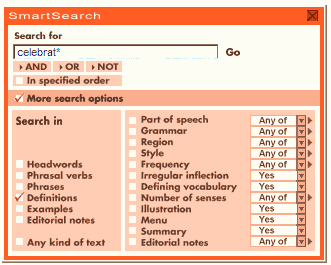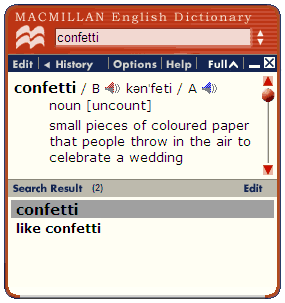|

FROM THE EDITOR
 In
this Issue In
this Issue
 Contributors Contributors
 Letters
to the Editor Letters
to the Editor
 Write
to Us Write
to Us
 Spread
the Word Spread
the Word
 Back
Issues Back
Issues
 Index Index
FEATURE
 Talking
Nonsense: Talking
Nonsense:
old-fashioned terms
for nonsense in English
COLUMNS
 Metaphor Metaphor
What we talk about
when we talk about
words and language
 Focus
on Language Focus
on Language
Awareness:
Introduction
Spoken discourse
Discourse markers
er, erm and OK
UK version ¦
US version
 New
word of the month New
word of the month
Extreme sports
of the noughties
 Top
Tips for the CD-ROMs Top
Tips for the CD-ROMs
Celebrating with
the CD-ROMs
 onestopenglish.com onestopenglish.com
|
 |
Top
Tips for the CD-ROMs
by Mairi
MacDonald
This month we look at how to use the CD-ROM to explore
vocabulary related to celebrations. In addition to extending vocabulary
the activities will also help with practising valuable dictionary skills.
1 Finding words relating to celebration
Using SmartSearch is the easiest way to find words
relating to celebrating and celebrations in the dictionary. The following
search will work on both MED and the Essential CD-ROMs,
although the Essential will return fewer results.
Type in celebrat* into the SmartSearch box.
Select More search options and tick Definitions.

This will look for definitions containing any word beginning
with 'celebrat…' — celebration, celebrates, celebrated
etc. In MED this gives you 122 results.
2 Activities
|
Write the following
list of words taken from the SmartSearch results onto the
board:
Bonfire Night/Guy Fawkes' Night
Burns Night
Flag Day
Hogmanay
Independence Day
Thanksgiving
The Notting Hill Carnival
New Year's Eve
Get students
to discuss what they already know about these celebrations/festivals
in small groups, for example what country they happen in, or if
these celebrations exist in the students' own country.
Then give students
the following handout and get them to match celebrations with the
appropriate definitions.
|
Bonfire Night/Guy Fawkes' Night |
|
the evening of 31st December, when
many people celebrate with their family or friends by staying
awake until midnight |
|
|
in the US, the day of 14th June
when people celebrate the day a flag was chosen for the country
in 1777 |
|
|
in Scotland, the evening of 31st
December and the celebrations that happen at that time |
|
|
in the US, the 4th of July, a national
holiday to celebrate the signing of the Declaration of Independence
in 1776 |
|
|
in the US, the fourth Thursday
in November, and in Canada, the second Monday in October, when
families have a special meal, traditionally to celebrate all
the things that they are grateful for |
|
|
a celebration that takes place
every August on the streets of Notting Hill, London |
|
The Notting Hill Carnival |
|
the night of 5th November, when
British people have bonfires and light fireworks to celebrate
the day in 1605 when Guy Fawkes was stopped before he was able
to destroy the Houses of Parliament |
|
|
January 25, the birth date of the
Scottish poet Robert Burns, that Scottish people celebrate by
having parties where they eat traditional Scottish food, especially
haggis |
Answers
|
|
Hand out the
list of words below. Ask students to organise the words into the
following groups:
| • |
Anniversaries |
| • |
Verbs relating to celebration |
| • |
Items you might bring to a celebration |
| • |
Events and types of celebration |
bash
bicentenary
birthday
blowout
bonfire
centenary
champagne
confetti |
dinner
extravaganza
hen night
homecoming
jamboree
jubilee
parade
party |
present
quartercentenary
ruby anniversary
silver wedding
stag night
tercentenary
wedding anniversary |
Students could
complete their result in the form of a mind map. Encourage students
to look up words they don't know in their dictionaries.
|
Tip
If your students
have access to the CD-ROM, give them the activity on screen.
Students can highlight a word to find the definition. Make
sure the dictionary is in QuickSearch mode and Automatic
lookup froxm screen is checked. This setting can be found
by clicking on Options in the menu bar.
|

Answers
|
3 Follow up activity
Get students to select five or six words and base questions
on them. Students can mingle and ask each other questions such as:
Have you ever been on a stag night?
When did you last drink champagne?
What was the occasion?
|





